hankyoreh
Links to other country sites 다른 나라 사이트 링크
Tulsi spent 4 years dreaming of life in Korea. Within 6 months of arrival, he was dead.
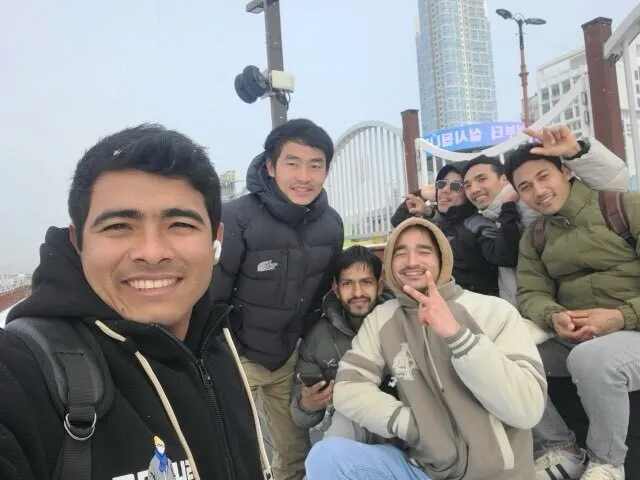
Tulsi Pun Magar was a people person. When the mood struck him, he was known to burst into song. He was outgoing by all measures, so much so that he even managed to make friends when he went to take the language test required for his Korean visa back in Nepal. He had come to Korea with his friends. He’d planned to take care of his family members back home and start a business with the money he made here. But those plans never came to fruition.
This 28-year-old young man who was working at a pig farm in Yeongam County, South Jeolla Province, took his own life on Feb. 22, 2025. He had only been in the country for six months on an E-9 work permit.
Tulsi’s coworkers bore witness to what they said had been constant bullying by his boss and crew leader.
Numerous workers had left the pig farm even before Tulsi’s death. One worker changed jobs after being assaulted by the boss and filed a complaint with an employment center. But nothing was done to address the situation.
When representatives from the Migrants’ Trade Union visited the pig farm on Feb. 24 to talk to the boss, workers were eager to talk about what they were going through. The video went viral on social media and was covered in major media back in Nepal.
That was when the farm owner finally released the Nepali workers to look for other workplaces.
On March 12, the Ministry of Employment and Labor raided the pig farm on charges that workers had been assaulted and that their wages had been withheld.
A reporter with the Hankyoreh 21 was present when seven workers from the pig farm were interviewed by lawyers from Minbyun-Lawyers for a Democratic Society in Gwangju on March 14. We draw upon the accounts of Tulsi’s coworkers for this retrospective of Tulsi’s brief life in Korea.
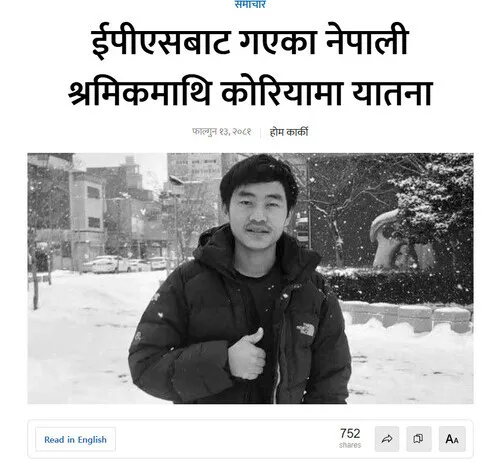
After four years of waiting to go to Korea, dead within six months of arrival
Tulsi hailed from the city of Pokhara in Nepal, known for its access to the Annapurna Circuit in the Himalayas. It took him four years of Korean tests and getting the necessary paperwork together before he finally set foot in Korea. Friends say that Tulsi was cheery and upbeat.
“He was the kind of person who’d go up to people and talk to them first,” said Tikaram, a friend of Tulsi’s who is also Nepali. “When I think of Tulsi, the first thing that comes to mind is his smile.”
Tulsi joined the farm, where some 3,000 pigs are being bred, in August 2024. The intensity of the work, and the brutal treatment of the workers, were almost unimaginable.
Jogendra, one of the workers, offered the following account: “[Tulsi] lost 7-8 kilograms in just three months. Other farms have 35 people to handle 80 sows, but here, 14 people have to do everything. The boss seems to have thought he could squeeze the extra work out of us. Cleaning the excrement typically takes five hours at other farms, but we were only given one hour to do it. We had to always be dashing around. If we walked, the crew leader would report us to the boss, and we’d get in trouble.”
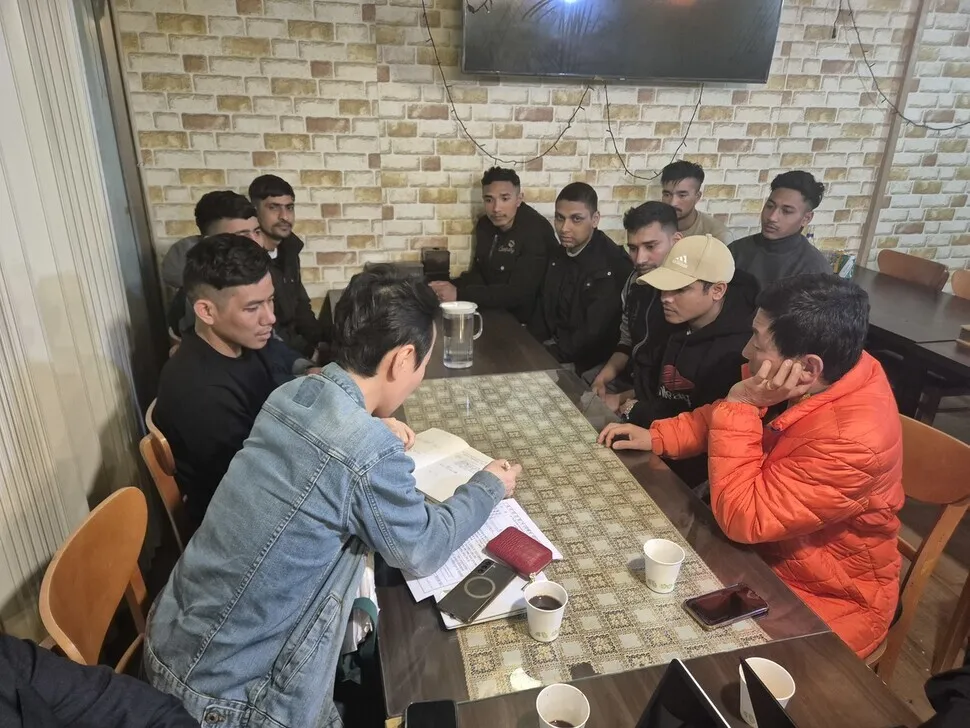
The main bullies were the boss and his Nepali crew leader. They would regularly call over employees during work hours to yell at them and shake them by the collar.
“The boss called Tulsi into his office and jabbed him in the stomach with a dry erase marker,” one of the workers said.
“We were having a meal when the crew leader was reaming out Tulsi. He would say, ‘Stop eating and look at me, Tulsi.’ He kept doing that for no good reason,” another worker said.
Bullying, overwork, and wage exploitation
The Ministry of Employment and Labor is currently investigating evidence that the pig farm violated the Labor Standards Act through such practices as delaying wages. Workers have testified that they were only given one day off a month, rather than the four days guaranteed in their contract, and that they were not paid for overtime.
Tulsi struggled to adjust to the job.
“About ten days after arriving, Tulsi said the job was too hard and that he didn’t think he could handle it. After that, he would often talk about wanting to get out of the job,” said Tikaram.
Workers who come to Korea on the Employment Permit System can apply for a change of workplace if they’re treated poorly by their employer. But it’s up to the worker to provide concrete evidence of their mistreatment. Applications are often blocked when the worker’s claim is contradicted by the employer.
Tulsi reportedly called an employment center to report his mistreatment. But he was told to supply evidence and informed he couldn’t change his workplace without a valid reason.
There was little chance of collecting evidence in a workplace where “workers’ pockets are checked when they leave the farm, and they aren’t allowed to carry around a phone,” according to one worker.
In October 2024, one of Tulsi’s coworkers quit after being assaulted by the boss. Around the same time, Tulsi managed to move to a different crew after being bullied by his crew leader.
But even on the new crew, Tulsi couldn’t avoid the notorious “assemblies.” Three times a day, the boss would bring workers together and berate them for over an hour.
“We spent more time at the assemblies than we did actually working,” the workers said.
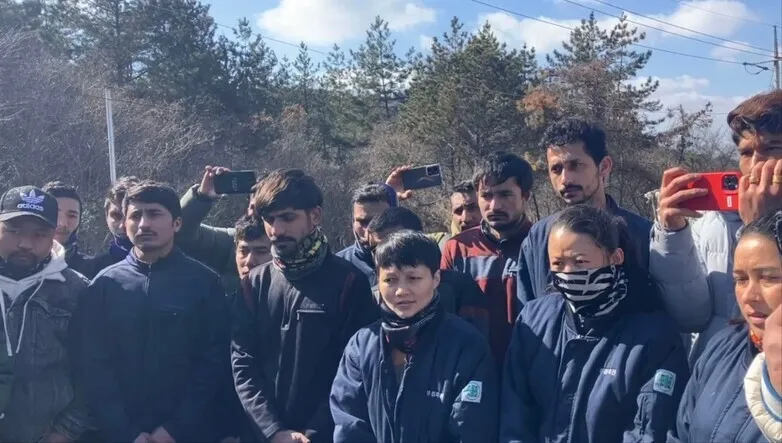
Forced to kneel and apologize
On Feb. 19, three days before his suicide, Tulsi fainted after working at the factory loading site since 4:30 am. When Tulsi didn’t immediately recover, his coworkers took him to the hospital and then returned to work.
Tulsi was still sick when he returned from the hospital, which earned him another tongue-lashing.
“The boss yelled at Tulsi for acting sick after taking a day off, when other workers who fainted had gotten better after an hour or two and gone back to work right away. Then the boss told Tulsi to go back to Nepal several times,” one of the workers recalled.
In his fury, Tulsi apparently agreed to go home. “When the boss asked Tulsi if he really wanted to go to Nepal, Tulsi quietly said he’d rather go home than be scolded and yelled at every day as he was here. I remember the boss buying him airplane tickets on the spot,” said a worker named Rakesh.
The boss set off for the Mokpo bus terminal around 4 pm with Tulsi and another worker. Then he took them to a motel in Mokpo and pulled out their airplane tickets.
At that point, Tulsi and the other worker had a change of heart and begged the boss not to send them back home.
“I was shocked when the boss gave us our airplane tickets. I said I didn’t want to go back to Nepal, and Tulsi said he wanted to work here. Then the crew leader said the boss would forgive us if we got on our knees and begged the way people do back in Nepal. So that’s what we did, right there on the spot,” Rakesh said.
Many migrant workers are reluctant to return home despite the horrific working conditions. That’s partly because of the fierce competition for getting a job permit in Korea.
It took four years before Tulsi was admitted to Korea. He couldn’t just return home empty-handed after a few months in the country.
Employers are hardly ignorant of migrant workers’ dilemma, and many take advantage of it.
On the morning of Feb. 21, the day after Tulsi returned to the farm, his crew leader badgered him to apologize in front of the entire crew. That elicited a grimace from the Nepali worker.
“He had a really dark expression on his face. It looked like he was thinking all kinds of bad things, like something was rising up from deep inside,” one of the workers said.
He worked tirelessly that whole day. He ate dinner with his coworkers as usual, then went to the 10 pm “assembly” before heading back to finish up work that remained. Yet, for whatever reason, Tulsi no longer seemed to be in bad spirits. In fact, his friends remember him smiling that night.
“It was like now there was nothing wrong. I feel like he was smiling and laughing a bit more than usual, and he looked happier too,” one said.
“There was something different about him that night. He was hard at work but smiling the whole time. It was like something had suddenly changed,” said another.
The next day, Saturday, Feb. 22, a worker at the farm was taking a call outside the building when they looked up and saw Tulsi’s body. The worker wailed upon discovering their colleague dead. Tulsi had died in one of the few places in the whole farm complex where there were no cameras keeping watch.
For the coworkers he left behind, Tulsi’s death hit home. “I was heartbroken and sad,” one said. “I also thought that the same thing could happen to me.”
While some worried that they might be next, they resolved not to go down the same path as their late friend.
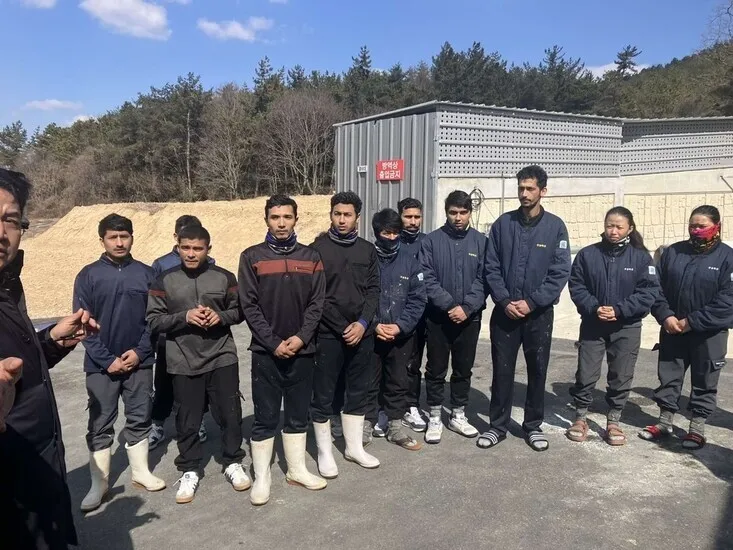
To the workers, there was only one word to describe the farm: prison.
“It was like a prison. You had to do everything as they told you, from how you sat, how you looked, to how you spoke,” Tikaram said. “I remember thinking that not even a prison would be as bad as that place — that I would be freer in jail than I would be there.”
In 2024 alone, 24 workers left the pig farm Tulsi worked at. That’s 60% of the farm’s 40 foreign employee maximum. But still, the Labor Ministry never intervened. Tulsi’s coworkers were only released from the farm after the death of their friend.
According to the Nepali outlet Kantipur, 85 Nepalis have died in Korea over the past five years. Half have died of suicide, but Koreans learn of far fewer, if any.
“Suicide is brushed off as owing to personal circumstances, and many people don’t speak out because they’re afraid that their bosses will find out,” said Udaya Rai, the president of the Migrants’ Trade Union. “There are more suicides just like this one that no one ever learns about.”
By Shin Da-eun, staff writer
Please direct questions or comments to [english@hani.co.kr]
Read the original Korean report here.
Editorial・opinion
![[Editorial] Korea, US need a ‘gentlemen’s agreement’ on what job creation entails [Editorial] Korea, US need a ‘gentlemen’s agreement’ on what job creation entails](https://flexible.img.hani.co.kr/flexible/normal/482/289/imgdb/original/2025/0911/9717575780802784.jpg) [Editorial] Korea, US need a ‘gentlemen’s agreement’ on what job creation entails
[Editorial] Korea, US need a ‘gentlemen’s agreement’ on what job creation entails![[Column] Why MAGA has its eyes set on Korea [Column] Why MAGA has its eyes set on Korea](https://flexible.img.hani.co.kr/flexible/normal/500/300/imgdb/original/2025/0911/2117575773523233.jpg) [Column] Why MAGA has its eyes set on Korea
[Column] Why MAGA has its eyes set on Korea- [Column] Lee still has his work cut out for him after summit with Trump
- [Editorial] Is this any way for the US to treat an ally?
- [Column] Lee’s difficult task of striking a balance on Japan
- [Editorial] Multipolar era means Seoul must broaden its diplomacy
- [Column] North and South Korea are no longer pawns in US-China-Russia relations
- [Column] Who we fail when we oversimplify the ‘comfort women’ issue
- [Column] How Seoul can navigate its security in a shifting world order
- [Editorial] Former first lady’s indictment is consequence of her acting as though she were president
Most viewed articles
- 1Seoul says US must fix its visa system if it wants Korea’s investments
- 2[Column] Why MAGA has its eyes set on Korea
- 3MAGA’s traveling circus comes to Korea
- 4Korea’s own MAGA evangelist brings American far right to Korean church youth
- 5Korean workers detained in ICE raid could depart US as early as Wednesday
- 6Construction hits delays at 4 LG Energy battery plants in US after Georgia raid
- 7Korea mulls how to respond if US demands ‘strategic flexibility’ of USFK at summit
- 8[Editorial] Korea, US need a ‘gentlemen’s agreement’ on what job creation entails
- 9A week after ICE raid, 300+ Koreans head to airport upon release
- 10Korean workers’ return held up by Trump’s proposal that they stay in US, Seoul says